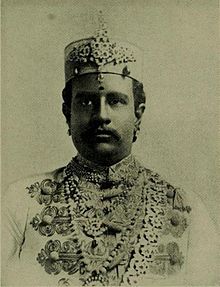
Back মারাভার Bengali/Bangla മറവൻ Malayalam मारावर (जात) Marathi Maravar SIMPLE மறவர் (இனக் குழுமம்) Tamil 马拉瓦尔族 Chinese
 Bhaskara Sethupathi, former Marava ruler of Ramnad kingdom | |
| Regions with significant populations | |
|---|---|
| India: Ramnad, Madurai, Tirunelveli regions of Tamil Nadu | |
| Languages | |
| Tamil | |
| Religion | |
| Hinduism | |
| Related ethnic groups | |
| Kallar, Agamudayar, Tamil people |
Maravar (also known as Maravan and Marava) are a Tamil community in the state of Tamil Nadu. These people are one of the three branches of the Mukkulathor confederacy.[1] Members of the Maravar community often use the honorific title Thevar.[2][3][4] They are classified as an Other Backward Class or a Denotified Tribe in Tamil Nadu, depending on the district.[5]
The Sethupathi rulers of the erstwhile Ramnad kingdom were from this community.[6] The Maravar community, along with the Kallars, had a reputation for thieving and robbery from as early as the medieval period.[7][8][9][10][11]
- ^ Dirks, Nicholas B. (1993). The Hollow Crown: Ethnohistory of an Indian Kingdom. University of Michigan Press. p. 73. ISBN 978-0-47208-187-5.
- ^ Neill, Stephen (2004). A History of Christianity in India: The Beginnings to AD 1707. Cambridge University Press. p. 76. ISBN 978-0-52154-885-4.
- ^ Hardgrave, Robert L. (1969). The Nadars of Tamilnad: The Political Culture of a Community in Change. University of California Press. p. 280.
- ^ Pandian, Anand (2009). Crooked Stalks: Cultivating Virtue in South India. Duke University Press. p. 286. ISBN 978-0-82239-101-2.
- ^ "List of Backward Classes Approved".
- ^ Pamela G. Price (14 March 1996). Kingship and Political Practice in Colonial India. Cambridge University Press, 14-Mar-1996 - History - 220 pages. p. 26. ISBN 9780521552479.
- ^ Ramaswamy, Vijaya (2007). Women and Work in Precolonial India: A Reader. Sage Publications. p. 74. ISBN 9789351507406.
- ^ Dirks, Nicholas (2007). The Hollow Crown: Ethnohistory of an Indian Kingdom. University of Michigan Press. p. 74. ISBN 9780472081875.
- ^ Balasubramanian, R (2001). Social and Economic Dimensions of Caste Organisations in South Indian States. University of Madras. p. 88.
- ^ Oscar Salemink, Peter Pels (2002). Colonial Subjects. Wiesbaden. p. 160. ISBN 0472087460.
- ^ Ferro-Luzzi, Gabriella Eichinger (2002). The Maze of fantasy in Tamil folktales. Wiesbaden. p. Glossary. ISBN 9783447045681.